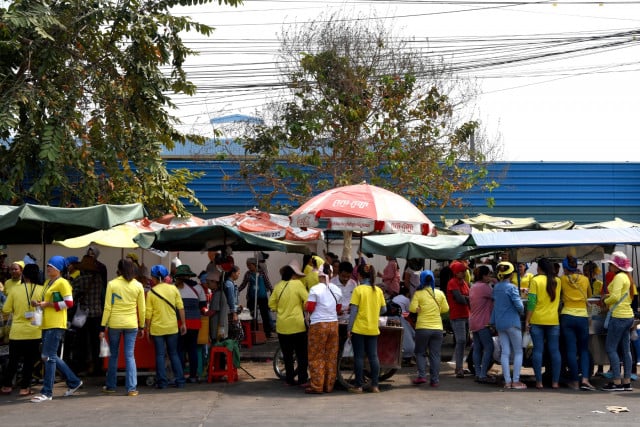Factory Closures Spark Social Fund Plea for Workers

- By Lay Sopheavotey
- and Meng Seavmey
- February 23, 2023 3:15 PM
PHNOM PENH – Labour unionists have called on the government to continue providing National Social Security Fund (NSSF) protection for workers laid off due to increasing factory closures.
Unofficial figures from the Free Trade Union of Workers of the Kingdom of Cambodia (FTUWKC) suggest that 13 factories have closed and work in 15 has been suspended since the beginning of this year.
The dramatic suspensions and closures have left many workers unemployed, though unionists say some have worked in the informal economy.
The NSSF provides workers with coverage for healthcare, occupational hazards and pensions during employment until retirement. Losing it is a concern for laid-off factory workers because the fund contributes a lot to their livelihood while they are working.
Unionist Theara, who worked in a factory that closed in January, said that when workers have health insurance it helps with medical or care costs.
“When we went to the hospital, we just needed to show them our ID card then they did some scanning, and after that we received the treatment, surgery or medicines without being charged for anything,” he said.
Theara worked in the factory for nearly 10 years and saw the workers growing reliant on NSSF benefits.
“Right now we are not having a health problem, so it’s not an issue, but, to think about it, if we will have any problem in the future, it’ll be a big financial problem,” he added.
The workers he saw in the factory were middle-aged women and they were more prone to sickness than men. “They were working hard. They needed health services often because they were the ones who got sick often,” Theara said.
Losing NSSF benefits was a concern because they had little likelihood of getting work in another factory because of their age. They would lose the benefits and, later, the pension.
He said most were making a living through informal economy activities such as selling food or snacks.
Vorn Phany said she had been a factory worker since 2012 and the NSSF membership had helped her several times with free medical care.
“When I had health problems like a headache or stomach ache, I did not pay for anything when I received the treatment from the partner hospital,” she said. This was one reason NSSF health insurance had been very important for her life.
Phany is looking for a new job after the factory in which she worked closed in January, She has two more months in which she can still use the NSSF membership.
On Feb. 14, during Social Protection Week, Ath Thon urged the government to keep providing social security funds for the workers, because the closures and suspensions can affect the workers’ chance of receiving NSSF benefits.
FTUWKC vice president Say Sokny said the figures of 13 factory closures and 15 suspensions were not official. Official figures would require approval from the Labour Ministry. The unofficial figures had been gathered from workers.
“The factory closure alone was a blow for the workers as filling the stomach is the priority, while health is life,” she said. Many workers had come to report how important the NSSF membership was to them. In their work life, health was essential, so health insurance was even more essential.
“As a unionist representing the organization, I also would like to request the NSSF to continue providing benefits to workers even though the factories have been closed,” she said.
NSSF deputy director-general Heng Sophannarith did not say directly whether the request would be possible or would be considered.
However, the NSSF would act according to principles set by the government. The fund was conducted in accordance with the law and standard letters or instructions.
Before 2016, the workers had received protection and insurance of the expenses on healthcare services and treatment caused by incidents.
Workers received benefits from low-risk occupational hazards — during work or travel to work — that include medical treatment and care services, compensation for temporary incapacity for work, allocation for permanent incapacity, allowance for permanent disability, allocation and annuity for survivors, and rehabilitation services.
Since 2016, workers have been able to receive the protection at all times, meaning that they can get treatment in health centers which are in partnership with the NSSF. The benefits include medical care, a daily allowance during hospitalization and a maternity allowance.
Recently, the social security fund on pensions has been implemented, becoming another benefit for private sector workers who are eligible for the pension as well as free health care from partner hospitals when they are getting old. It covers retirement pensions, unemployment pensions, survivor pensions and cremation allowances.
NSSF members can receive benefits for two more months when they have contributed to the NSSF for two months in a row. They can still use the NSSF membership if they have contributed for six of in the last 12 months, counting until the day they have health problems or maternity.















